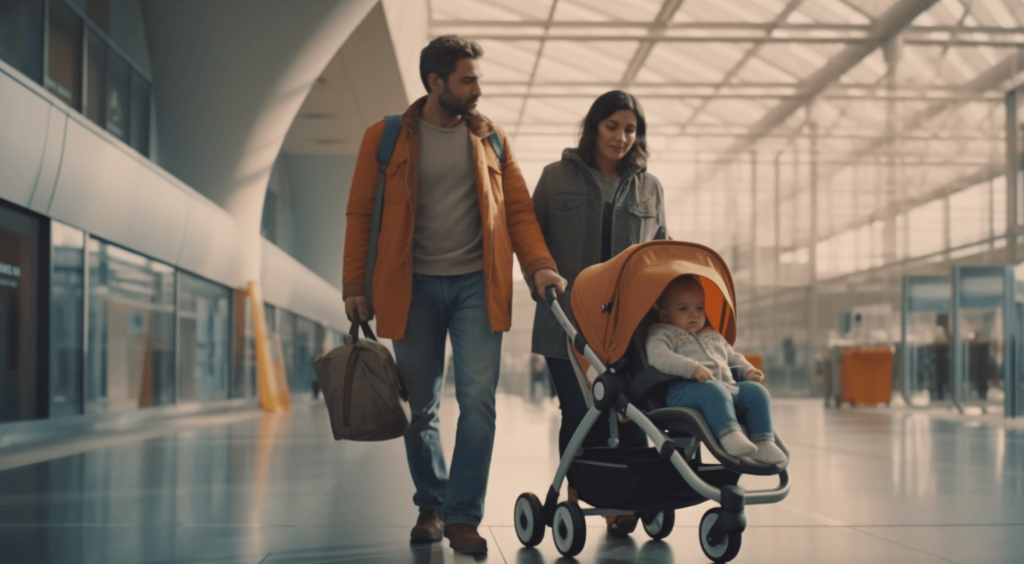Using a lightweight

Cheapest Option: Car Seat Straps
The cheapest options are straps that let you strap your car seat to your suitcase.
This is an easy option if you don’t want to bring extra gear, and it’s easy to store in a suitcase when you’re done.
However, it doesn’t allow your kid to ride in the car seat through the airport, and larger car seats tend to overpower lightweight carry-on suitcases, especially 4-wheel spinner-style bags.
Carts: Rolling Carriers for Child Safety Seats
A car seat
These carts connect to car seats, making them much easier to transport, but it’s also one more thing to carry around, and find somewhere to put it on the plane.
They won’t take the place of a stroller when you get where you’re going.
One of the top-rated carts is this one that folds up to a compact size and is made by the well-known Britax company.
Car Seat Bags / Backpacks
Using a car seat bag is convenient and cheap. We often gate-checked our car seat or checked it at the ticket counter. We used a carrying bag for years, to keep the car seat from getting dirty, damaged, or wet.
The downside to these bags is some car seats aren’t light, and you can feel the weight after walking around the airport with one for a while.
The other (obvious) downside to the bags is that your child can’t ride in the seat while you are on the move. But it’s a good option if your kid is old enough to walk and you just need the car seat at your destination.
Some of the cheaper bags, such as our older version of the KangoKids bag, also have thin shoulder straps, which would dig into my shoulders.
You don’t want to carry a heavy metal-framed car seat on long walk to your hotel in one of these things! It was always a relief to drop this bag off and have that weight gone!
Booster Seats
Like being able to leave the pack-n-play crib at home, parents celebrate when their kids graduate from a car seat to a booster seat, making travel much lighter.
You can carry a booster seat using the built-in handle, but the best way to protect it is to put it in a protective bag like these ones below. Most can which can be hooked around the handle of a rolling suitcase, or carried over your shoulder.
Another great option is buying a cheap booster seat to use at your destination; you can often buy one for less than it costs to rent one through a rental car company:
Another great option is buying a cheap booster seat to use at your destination; you can often buy one for less than it costs to rent one through a rental car company:
Best Car Seats for Travelling
The Nuna Stokke PIPA Infant is one of the best car seats for air
For a lower-priced alternative, check out the Safety 1st Guide 65 Convertible Car Seat at around $90.
Other Kids Air Travel Essentials
Here are some other things we’ve found helpful when traveling with kids.
Lusso Gear No-Drop Traveling Airplane Tray: This travel tray is a lifesaver for parents traveling with kids.
It’s sturdy, easy to install, and provides a flat surface for eating, playing, or drawing. The no-drop design is a nice feature, keeping everything from snacks to toys in place even during flight.
Busy Board for Toddlers – Montessori Travel Essentials: The Busy Board is an engaging and educational tool for toddlers.
With its various buckles, zippers, and laces, it helps develop fine motor skills while keeping kids entertained.
It’s compact and lightweight, making it perfect for travel.
Dramamine Motion Sickness Relief for Kids, Grape Flavor
Dramamine for Kids is a trusted product for preventing motion sickness. The chewable format and grape flavor make it kid-friendly, and it we always have some on hand for air travel.
However, some children may not like the taste, and remember that it can cause drowsiness.

























